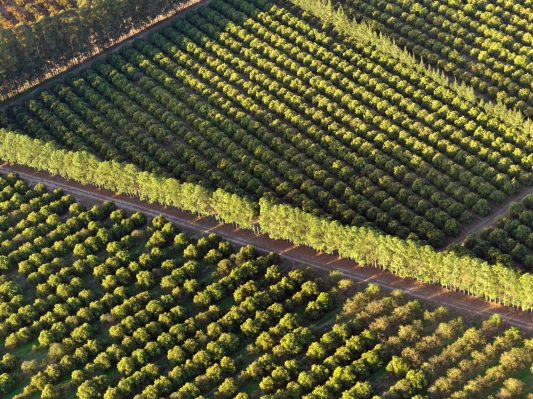Business
Latin America’s food paradox

Latin American farms and fields produce a lot of food, but 47 million people still remain hungry.
The region accounts for about a quarter of global exports in agricultural and fisheries products, including fruits and vegetables, salmon, maize, sugar and coffee. The agricultural sector is crucial for Latin American livelihoods, contributing to an average of 4.7% of GDP and employing at least 14% of the region’s population.
But paradoxically, the number of undernourished people in the region keeps growing year after year, increasing by around 13 million people over the past five years. The Pan American Health Organization estimates that by 2030, “hunger will affect 67 million people in the region, a figure that does not take into account repercussions of the COVID-19 pandemic.”
One major culprit: food waste. More than a third of the food produced each year around the globe is lost or wasted, and Latin America and the Caribbean are no exception. With a different and enhanced distribution chain, that amount of wasted food could be enough to nourish up to 2 billion people globally.
Here’s the rub: If we want to successfully address malnutrition in Latin America, agritech and food tech solutions need to come from within. Not just because Latin America has enormous natural wealth, but because almost every Latin American has experienced food insecurity in one way or another, and someone who understands the problem is best suited to build a suitable solution.
Ady Beitler, chief executive officer at Nilus, puts it well: “There’s more food out there than what’s needed to eradicate hunger. That’s for sure. What doesn’t exist is a distribution system that can get that food to those who most need it.”
Fortunately, Latin America is also a crib of creative minds that are crafting agritech and food tech solutions to better distribute food, increase agricultural efficiency and prevent people from being hungry. Entrepreneurs are helping farmers access tools that can better support them, reduce food waste and develop plant-based products. These solutions tackle the different parts of the food production system, from fields to plates.
One category of innovation that can reduce food waste: tools to help farmers improve field productivity. For example, Sensix from Minas Gerais, Brazil, uses drones and machine learning to map lands’ fertility. Ciencia Pura, a Chilean startup, implements software that illuminates plants throughout their different growth stages when natural light is unavailable.
A related category: innovation that helps reduce food loss through pest control. Typically, farmers control pests with a fungicide that creates health risks for both consumers and farmers. Plus, farmers normally detect pests too late and crops are lost.
Costa Rican startup ClearLeaf created a nontoxic, natural fungicide that enhances plant growth. And Brazilian startup SensaIoTech operates a platform that monitors crops and collects information to identify and detect pests on time.
The supply chain represents another important window to prevent food waste and, as a consequence, reduce greenhouse gas emissions.
Food that’s thrown away in one neighborhood for being “imperfect” is still healthy and consumable for another one where people are starving. That’s why Argentinian startups are revolutionizing logistics: Nilus recovers food that is perfectly safe to eat but would otherwise be thrown out and delivers it to low-income neighbors at discounted prices. Savetic develops software that traces products, analyzes data and predicts consumer trends to decrease food waste in supermarkets.
Another category to reduce food waste: agricultural waste reuse. Chilean startup Fotortec transforms agricultural waste into mushrooms that can be used as a flavor and protein enhancer. Peruvian startup Bio Natural Solutions reuses tropical fruit waste to develop a natural and nontoxic protection for fruits and vegetables that doubles their shelf life.
Lastly, entrepreneurs are finding plant-based products that provide protein and nutrition in an environmentally friendly way. Plant Squad from Mexico City develops alternative plant-based protein products that are nutrient dense and environmentally conscious. Faba, from São Leopoldo, Brazil, sustainably extracts proteins from chickpeas.
The food system in Latin America is large and complex and won’t change in one day. But these startups (and many more) are leading the way in creating a collective response and building awareness around the financial support that these entrepreneurs need.
The agritech and food tech sectors are generating interest from international and regional investors and other ecosystem builders. If entrepreneurs received even more support from these important ecosystem players, the exorbitant amount of food waste could be reduced and entrepreneurs would build a fair and sustainable food system in Latin America.
-

 Entertainment6 days ago
Entertainment6 days agoWordPress.org’s login page demands you pledge loyalty to pineapple pizza
-

 Entertainment7 days ago
Entertainment7 days agoRules for blocking or going no contact after a breakup
-

 Entertainment6 days ago
Entertainment6 days ago‘Mufasa: The Lion King’ review: Can Barry Jenkins break the Disney machine?
-

 Entertainment5 days ago
Entertainment5 days agoOpenAI’s plan to make ChatGPT the ‘everything app’ has never been more clear
-

 Entertainment4 days ago
Entertainment4 days ago‘The Last Showgirl’ review: Pamela Anderson leads a shattering ensemble as an aging burlesque entertainer
-

 Entertainment5 days ago
Entertainment5 days agoHow to watch NFL Christmas Gameday and Beyoncé halftime
-

 Entertainment4 days ago
Entertainment4 days agoPolyamorous influencer breakups: What happens when hypervisible relationships end
-

 Entertainment3 days ago
Entertainment3 days ago‘The Room Next Door’ review: Tilda Swinton and Julianne Moore are magnificent

















